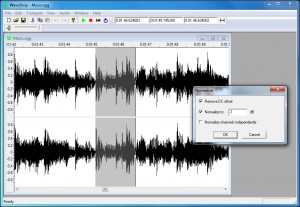Edit audio with no loss of quality using WaveShop
 If you’d like to edit an audio file then there’s plenty of free tools around to help, however most of them are prone to altering your files in unexpected ways. To test this yourself, just open any file, save it with a different name, and compare that file with the original. Even though you’ve not performed any operations on the second file at all, you’ll still often find there are differences, and inevitably that’s going to mean some compromise in sound quality.
If you’d like to edit an audio file then there’s plenty of free tools around to help, however most of them are prone to altering your files in unexpected ways. To test this yourself, just open any file, save it with a different name, and compare that file with the original. Even though you’ve not performed any operations on the second file at all, you’ll still often find there are differences, and inevitably that’s going to mean some compromise in sound quality.
WaveShop takes an alternative approach. The program is specifically designed to be bit-perfect, only altering your audio when it’s absolutely necessary. So if you open a file and then save it immediately, there will be no changes. And if you carry out some editing task on one area of the file -- fade it out at the end, say -- everything else remains exactly as it was.
The program is open source, and comes in a variety of forms: portable, 32-bit, 64-bit and so on. For performance reasons it’s designed to process audio files entirely in memory, so where possible you should always opt for a 64-bit build.
Whatever you choose, though, the download will be relatively small (just over 1MB). Installation is quick and easy, and on launch you’ll find a very familiar interface -- there are no great surprises here and you’ll know immediately what to do.
Specifically, open an audio file (WAV, AIFF, AU, AVR, CAFF, FLAC, HTK, IFF, MAT4, MAT5, MPC, OGG, PAF, PVF, RAW, RF64, SD2, SDF, VOC, W64, WVE and 6I formats are supported), it’s presented in a standard waveform-type display, and you can zoom in, select whatever area you like, and delete or copy and paste it wherever you need.
 The program has some effects you can apply, too. You’re able to amplify audio, for instance, fade it in or out, or scan your file for clipped audio.
The program has some effects you can apply, too. You’re able to amplify audio, for instance, fade it in or out, or scan your file for clipped audio.
A "Change Format" option adjusts the sample rate, sample size and number of channels.
There are Reverse and Invert tools; you get simple Peak and RMS statistics, and there are a host of ways to work with channels. You can insert, delete or swap them, for instance; extract channels to mono files; even edit surround sound audio to decide which channel is assigned to a particular speaker.
And if you’ve problems with any of this then an excellent Help file (a real Windows Help file, not a PDF or a link to some inadequate web page) does a good job of explaining what you need to know.
WaveShop doesn’t have a lot of processing options, then, but there’s a reasonable selection for version 1.0, and its non-destructive nature means there may be already good reason to use the program for simple editing tasks. So if you’d like to preserve your audio quality, as much as possible, then it’s definitely worth a try.
Photo Credit: asiana/Shutterstock
